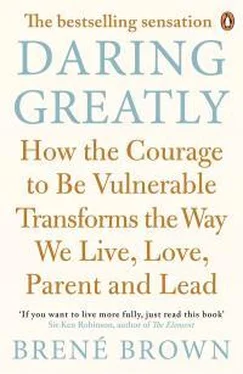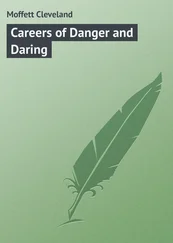If you want a culture of creativity and innovation, where sensible risks are embraced on both a market and individual level, start by developing the ability of managers to cultivate an openness to vulnerability in their teams. And this, paradoxically perhaps, requires first that they are vulnerable themselves. This notion that the leader needs to be “in charge” and to “know all the answers” is both dated and destructive. Its impact on others is the sense that they know less, and that they are less than. A recipe for risk aversion if ever I have heard it. Shame becomes fear. Fear leads to risk aversion. Risk aversion kills innovation.
The bottom line is that daring greatly requires worthiness. Shame sends the gremlins to fill our heads with completely different messages of:
Dare not! You’re not good enough!
Don’t you dare get too big for your britches!
The term gremlin —as we are most familiar with it—comes from Steven Spielberg’s 1984 horror comedy Gremlins. Gremlins are those evil little green tricksters who wreak havoc everywhere they go. They’re manipulative monsters that derive pleasure from destruction. In many circles, including my own, the word gremlin has become synonymous with “shame tape.”
For example, I was recently struggling to finish an article. I called a good friend to tell her about my writer’s block, and she immediately responded by asking, “What are the gremlins saying?”
This is a very effective way of asking about the shame tapes—the messages of self-doubt and self-criticism that we carry around in our heads. My answer was “There are a few of them. One’s saying that my writing sucks and that no one cares about these topics. Another one’s telling me that I’m going to get criticized and I’ll deserve it. And the big one keeps saying, ‘Real writers don’t struggle like this. Real writers don’t dangle their modifiers.’ ”
Understanding our shame tapes or gremlins is critical to overcoming shame because we can’t always point to a certain moment or a specific put-down at the hands of another person. Sometimes shame is the result of us playing the old recordings that were programmed when we were children or simply absorbed from the culture. My good friend and colleague Robert Hilliker says, “Shame started as a two-person experience, but as I got older I learned how to do shame all by myself.” Sometimes when we dare to walk into the arena the greatest critic we face is ourselves.
Shame derives its power from being unspeakable. That’s why it loves perfectionists—it’s so easy to keep us quiet. If we cultivate enough awareness about shame to name it and speak to it, we’ve basically cut it off at the knees. Shame hates having words wrapped around it. If we speak shame, it begins to wither. Just the way exposure to light was deadly for the gremlins, language and story bring light to shame and destroy it.
Just like Roosevelt advised, when we dare greatly we will err and we will come up short again and again. There will be failures and mistakes and criticism. If we want to be able to move through the difficult disappointments, the hurt feelings, and the heartbreaks that are inevitable in a fully lived life, we can’t equate defeat with being unworthy of love, belonging, and joy. If we do, we’ll never show up and try again. Shame hangs out in the parking lot of the arena, waiting for us to come out defeated and determined to never take risks. It laughs and says, “I told you this was a mistake. I knew you weren’t _________ enough.” Shame resilience is the ability to say, “This hurts. This is disappointing, maybe even devastating. But success and recognition and approval are not the values that drive me. My value is courage and I was just courageous. You can move on, shame.”
So, I’m not trying to kill you. I’m just saying, “We can’t embrace vulnerability if shame is suffocating our sense of worthiness and connection.” Strap yourself in, and let’s get our heads and hearts around this experience called shame, so we can get about the business of truly living.
WHAT IS SHAME AND WHY IS IT SO HARD TO TALK ABOUT IT?
(If you’re pretty sure that shame doesn’t apply to you, keep reading; I’ll clear that up in the next couple of pages.)
I start every talk, article, and chapter on shame with the Shame 1-2-3s, or the first three things that you need to know about shame, so you’ll keep listening:
We all have it. Shame is universal and one of the most primitive human emotions that we experience. The only people who don’t experience shame lack the capacity for empathy and human connection. Here’s your choice: Fess up to experiencing shame or admit that you’re a sociopath. Quick note: This is the only time that shame seems like a good option.
We’re all afraid to talk about shame.
The less we talk about shame, the more control it has over our lives.
There are a couple of very helpful ways to think about shame. First, shame is the fear of disconnection. We are psychologically, emotionally, cognitively, and spiritually hardwired for connection, love, and belonging. Connection, along with love and belonging (two expressions of connection), is why we are here, and it is what gives purpose and meaning to our lives. Shame is the fear of disconnection—it’s the fear that something we’ve done or failed to do, an ideal that we’ve not lived up to, or a goal that we’ve not accomplished makes us unworthy of connection. I’m not worthy or good enough for love, belonging, or connection. I’m unlovable. I don’t belong. Here’s the definition of shame that emerged from my research:
Shame is the intensely painful feeling or experience of believing that we are flawed and therefore unworthy of love and belonging.
People often want to believe that shame is reserved for people who have survived an unspeakable trauma, but this is not true. Shame is something we all experience. And while it feels as if shame hides in our darkest corners, it actually tends to lurk in all of the familiar places. Twelve “shame categories” have emerged from my research:
Appearance and body image
Money and work
Motherhood/fatherhood
Family
Parenting
Mental and physical health
Addiction
Sex
Aging
Religion
Surviving trauma
Being stereotyped or labeled
Here are some of the responses we received when we asked people for an example of shame:
Shame is getting laid off and having to tell my pregnant wife.
Shame is having someone ask me, “When are you due?” when I’m not pregnant.
Shame is hiding the fact that I’m in recovery.
Shame is raging at my kids.
Shame is bankruptcy.
Shame is my boss calling me an idiot in front of the client.
Shame is not making partner.
Shame is my husband leaving me for my next-door neighbor.
Shame is my wife asking me for a divorce and telling me that she wants children, but not with me.
Shame is my DUI.
Shame is infertility.
Shame is telling my fiancé that my dad lives in France when in fact he’s in prison.
Shame is Internet porn.
Shame is flunking out of school. Twice.
Shame is hearing my parents fight through the walls and wondering if I’m the only one who feels this afraid.
Shame is real pain. The importance of social acceptance and connection is reinforced by our brain chemistry, and the pain that results from social rejection and disconnection is real pain. In a 2011 study funded by the National Institute of Mental Health and by the National Institute on Drug Abuse, researchers found that, as far as the brain is concerned, physical pain and intense experiences of social rejection hurt in the same way. So when I define shame as an intensely “painful” experience, I’m not kidding. Neuroscience advances confirm what we’ve known all along: Emotions can hurt and cause pain. And just as we often struggle to define physical pain, describing emotional pain is difficult. Shame is particularly hard because it hates having words wrapped around it. It hates being spoken.
Читать дальше






![Брене Браун - Вопреки. Как оставаться собой, когда всё против тебя [litres]](/books/436389/brene-braun-vopreki-kak-ostavatsya-soboj-kogda-v-thumb.webp)





